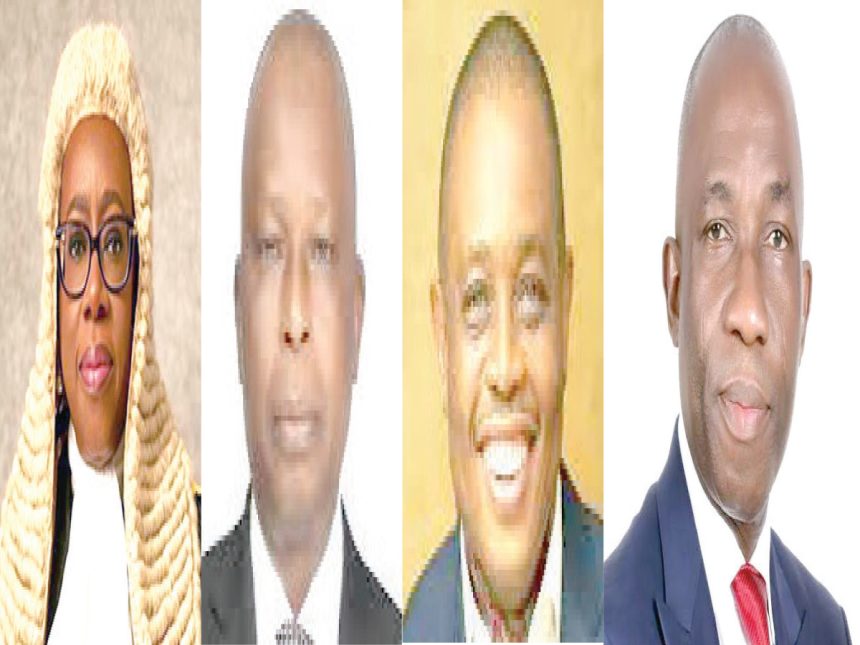Using peoples’ image without consent is considered a normal trend by many people in Nigeria but this seems to be a norm that may be faced out with the commercialisation of image rights by celebrities which will make it difficult to use their image without payment, ADEOLA OJO in this report explores analyze the legal framework for image rights in Nigeria and its commercialization, as well as make recommendations for navigating the dynamic landscape of image rights.
Moving across Nigeria, it is not strange to see the images of popular figures on businesses; both big and small. And nothing comes out of it because people do not see anything wrong in this. This however may not be the situation again as image rights is now a lucrative business model for celebrities, who can leverage their fame to associate their likeness or voice with a brand. This can enhance sales and visibility, while the celebrities receive royalties in return.
Image rights becomes important and obvious when known figures in the society, musicians, models, reality television personalities, actors, comedians, athletes, renowned authors, etc., cultivate brands associated with their personalities. Image rights are like property rights, suggesting that aspects of an individual’s personality cannot be utilised without explicit permission, much like the protection afforded to other forms of property under the law.
Example of this is when music star, Iyanya signed a $350,000 endorsement agreement with Zinox Computer in 2013. Another case is when reality TV personality, Erica Nlewedim entered into multimillion-dollar agreements to endorse Partner Mobile Nigeria in 2021 and also assumed the role of brand ambassador for Swarovski Nigeria, a luxury jewellery brand.
These endorsements reveal the significant value held by celebrities and media personalities, fostering an environment that empowers both product vendors and ambassadors to leverage this value for their mutual economic benefit. However, it doesn’t mean that individuals who are not public figures lack image rights, influencers and other everyday people can also fight for their image rights.
Though the capacity of a claimant to effectively demonstrate the possession of goodwill or substantial influence may be elements to be evaluated in any legal action concerning image rights but it is a fact that image rights cases have predominantly been initiated and successfully pursued by celebrities more easily because they have the personality to effectively lay claims.
Personality rights protect an individual’s name, likeness, voice, and other identifying characteristics from unauthorized commercial use. In Nigeria, these rights intersect with copyright law to protect both the subject and creator of images.
Legally, the protection of image rights holds significant importance within the Nigerian legal framework and it allows people to take charge of the utilisation of their likeness. These rights serve as a barrier against unauthorised exploitation or commercial gain derived from the portrayal of an individual’s identity without their explicit consent which is a norm in Nigeria.
Facts about image use
An image, whether captured through photography or depicted in artwork, encapsulates the essence of a person, animal, or object, thereby implicating the necessity for regulatory measures to govern its usage. Through the assertion of image rights, individuals are empowered with the means to oversee the representation of their public persona, thereby ensuring autonomy over their image
However, to establish infringement of image rights, the claimant must demonstrate some facts: that the person suing has a legal right to their own identity or personal characteristics, that the person being sued has used part of the other person’s identity or characteristics without permission in a way that makes the other person recognisable and that the unauthorised use by the person being sued is likely to harm the commercial value of the other person’s identity or characteristics.
Protecting image rights in Nigeria
Specific legislative provision that directly addresses the protection of image rights doesn’t exist in Nigeria, but certain legal instruments provide a foundation for the recognition and safeguarding of these rights; Constitution of the Federal Republic of Nigeria 1999, as amended, along with relevant Intellectual Property statutes.
The Constitution establishes the cornerstone of the legal framework and provides the foundational basis that safeguards privacy rights, basically by the provisions of Section 37 of the Constitution which broadly guarantees and protects Nigerians’ right to privacy concerning their homes, correspondence, telephone conversations, and telegraphic communications.
The visual portrayal of an individual can be deemed private and unique to that individual. Consequently, individuals possess the right to determine the extent of personal information they divulge to the public, including their image or appearance. Also, they have the right to prohibit third parties from exploiting or commercialising such image without prior consent or authorization
There is also the Data Protection Act which is due to the widespread availability of digital information in contemporary times which made it easy for some unethical individuals to appropriate the images or likenesses of prominent personalities from the internet for personal gain. The Data Protection Act of 2023 was promulgated to offer a remedy by endowing individuals who provide their data with specific rights, granting them authority over the usage of such data; the Act delineates criteria for lawful data processing and emphasises the indispensability of obtaining consent from the data subjectwhile reinforcing safeguards by stipulating that the mere silence or inactivity of data subjects does not constitute consent.
In addition, the Act stipulates that a data subject retains the prerogative to revoke consent for the processing of their data at any juncture and in Section 36, it provides that the data subject has the entitlement to object to the processing of their data, a directive to which the data controller must promptly adhere, except where compelling public interest or legitimate reasons are at stake. However, even with this provision, any assertion of public interest or legitimate reasons must demonstrably outweigh the data subject’s fundamental rights.
There is also the Copyright Ac which gives Image rights legal protection by giving the rights to creators over their literary, musical, or artistic works, constituting a form of intellectual property that grants exclusive rights to the copyright owner. Section 1(1) of the Copyright Act delineates the categories of works eligible for copyright protection, including literary, musical, artistic, cinematographic, and sound recordings. As a result, the eligibility for copyright protection extends to artistic works and cinematographic films which can encompass a person’s personality or image depicted in mediums such as photographs, paintings, sculptures, or cinematography. Consequently, when such works are captured in any of these mediums, they are inherently granted protection under the law, regardless of whether they have been formally registered or lodged with the Nigeria Copyright Commission
One other protection is found under the Trade Marks Act which in its Section 67 as amended by the Business Facilitation (Miscellaneous Provision) Act, defines a trademark as a mark that is employed or intended for use concerning goods or services. Its purpose is to establish a connection between the goods or services and an individual possessing the right, whether as a proprietor or a registered user, to utilise the mark.
There is also the Cybercrimes (Prohibition and Prevention) Act which stipulates that an offence occurs when an individual utilises a name, business name, trademark, domain name, or any other word or phrase that is registered, owned, or in use by any individual, corporation, or entity of the Federal, State, or Local Governments in Nigeria. Under the Act, unauthorized use of an image must pertain to trademarked or copyrighted material for a violation to be established, typically in the context of online marketing and advertising. Thus, where an image enjoys protection under Nigerian trademark or copyright laws and its rights are infringed upon through computer usage, the aggrieved party is entitled to seek recourse or compensation for the breach of their intellectual property rights. Consequently, this avenue presents the most viable legal remedy for individuals whose image rights have been infringed upon in Nigeria.
Internationally, image rights vary dramatically. The EU’s GDPR has created stricter consent requirements, while the US has complex state laws. For Nigerian festivals attracting international attention, this creates interesting jurisdictional questions.
Cases of image commercialization
In most cases, only celebrities protect their image rights and prevent unauthorised use globally. An example of such in Nigeria is when actor, Richard Mofe Damijo filed a lawsuit against Jumia for unauthorised appropriation of his likeness on their social media platform, a clear case contesting unauthorised use of image rights
Are there perfect image laws?
In events across Nigeria, especially festivals, taking people’s image is a norm; from professional photographers capturing the grandeur to people snapping selfie to create a perfect visual story. But few consider the important question of rights; who owns the image when the camera clicks?
There is a fascinating intersection of copyright law and personality rights that move through the lens of Nigeria’s most photogenic festival. When does taking a photo become a legal issue? Who owns the rights to those viral event images?
Photography at events, especially carnivals and festivals, involves multiple layers of rights. When a photographer captures an image, they automatically own the copyright to that photograph under Nigeria’s Copyright Act 2022. However, it goes beyond this; but the story doesn’t end there, people in those photographs have rights too.
There are diverse scenarios from festivals using Ojude Oba as a case study: a professional photographer captures a striking portrait of a Regberegbe member in full traditional attire and sells it to a tourism company for their marketing campaign, a news outlet publishes photos of the festival to accompany their cultural coverage or a social media influencer takes a selfie with festival participants and uses it to promote a fashion brand or his account without the participants’ consent; these involves different legal considerations under Nigerian law.
Under Nigeria’s Copyright Act 2022, photographers automatically own copyright in their original photographs. This gives them exclusive rights to reproduce, distribute, display, and create derivative works. However, personality rights create additional protection layers. While Nigeria lacks comprehensive personality rights legislation, the courts recognises individual rights over commercial use of their likeness.
The intended use of festival photographs significantly impacts their legal status. Editorial use enjoys broader protection under fair-dealing provisions, while commercial use typically requires consent from recognisable individuals.
Do you need permission or not?
For commercial use; permission is required and it involves stock photography sales, advertising campaigns, product packaging and sponsored social media content
But for editorial use, there is general protection for uses like news reporting, educational content, personal and non-commercial sharing as well as documentary purposes
Most festival photography today happens on smartphones and gets shared instantly. This creates legal gray areas in cases such as when influencers use festival photos for sponsored content, images go viral and get picked up by commercial entities or pictures are used in ways that could harm someone’s reputation
The Copyright Act 2022 doesn’t explicitly address social media sharing, leaving many situations in legal limbo.
Self protection
If you are a photographer: Get model releases for commercial shots when possible, understand fair dealing protections for editorial use and watermark your work to maintain attribution
But if you are photographed: Know that you can’t stop public photography at public events, understand you can object to unauthorized commercial use of your likeness and be conscious that you have personality rights that extend beyond the camera
Effective image protection
Experts recommend that for there to be effective protection on image use in Nigeria, there should be reforms. Oyetola Muyiwa Atoyebi (SAN) in a write-up titled ‘Image Rights in Nigeria: A Legal Perspective’ said that “Legislative reform is imperative in Nigeria to address the dynamic landscape of image rights, particularly in light of the escalating complexities brought about by advancements in digital technologies. Specific legislation is required to amend already existing laws that will provide for the protection and commercialization of image rights, offering unequivocal definitions, guidelines, and recourse for infringement. This legislative framework will be aimed at enhancing clarity and legal assurance for both rights holders and users alike.”
He also advocated for awareness and education, noting that efforts should be made to raise awareness among individuals, especially celebrities and public figures, about their image rights and the legal mechanisms available for their protection as education campaigns can help empower individuals to assert their rights and take appropriate legal action when necessary.
Further, he called for strengthening enforcement mechanisms as the enforcement of image rights requires effective mechanisms to deter infringement and provide remedies for rights holders adding that, “this may involve enhancing the capacity of law enforcement agencies, streamlining legal procedures, and imposing meaningful penalties for violations as well as collaboration between rights holders, industry stakeholders, and government agencies is essential to developing best practices, codes of conduct, and industry standards for the commercialization of image rights. This collaboration can help foster a fair and transparent marketplace while protecting the interests of all parties involved.”
According to experts, the commercialisation of image rights in Nigeria presents both opportunities and challenges for rights holders, businesses, and consumers as while it can generate economic value for celebrities and brands; it raises legal and ethical concerns about privacy, consent, and fair competition.
“The absence of specific legislation highlights the need for comprehensive legal reforms to ensure adequate protection and enforcement mechanisms. Establishing clear legal frameworks, raising awareness, and fostering collaboration among stakeholders can create a responsible and ethical commercialization environment. Ultimately, the protection of image rights is a legal and moral obligation to uphold individual rights and dignity in a digitalized world. Policymakers, businesses, and society must collaborate to balance innovation, economic growth, and respect for human rights and dignity in a digitized world,” they argued.
READ ALSO: Human rights in crisis: Addressing the challenges facing Nigeria (2)






